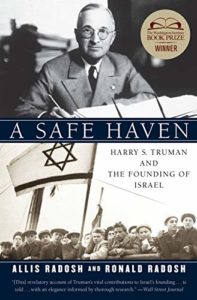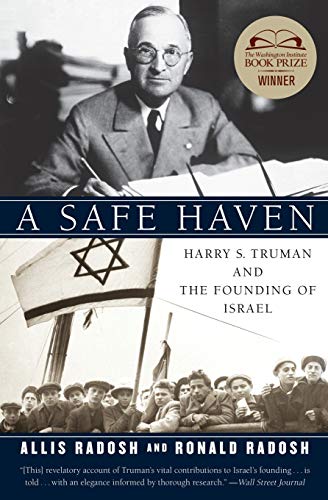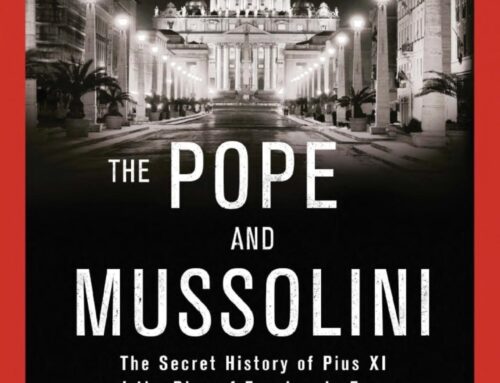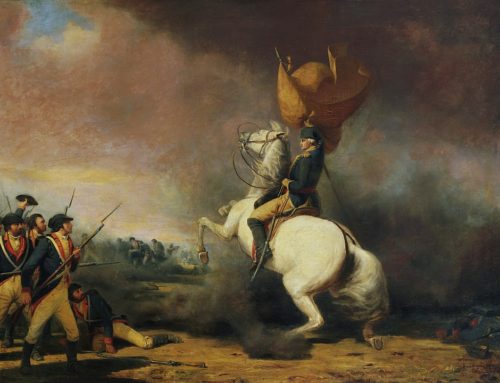 By Allis Radosh and Ronald Radosh
By Allis Radosh and Ronald Radosh
Dust Jacket
“Even though I knew how the story would end, A Safe Haven still had me sitting on the edge of my seat, watching Harry Truman weigh the arguments of his friends and advisers in the months, then weeks, then days lead up to his recognition of Israel.”
-Cokie Roberts
I think Ms. Roberts’s summation of the drama surrounding Israel’s statehood captures the essence of the story. In the end, the Jewish Statehood came down to the “little man from Missouri.”
To summarize the book, Harry Truman recognized Israel for two reasons (1) he was fundamentally a Christian Zionist who truly believed that Jewish statehood fulfilled Biblical prophesies and (2) he despaired over the fate of hundreds of thousands of homeless Jews living in awful conditions some three years after World War II ended. The only refuge of these Holocaust survivors was a Jewish state (referred to as Palestine). That is, no other country was prepared to harbor hundreds of thousands of Jews. Moreover, unlike the million of other displaced persons caused by World War II, Jews adamantly refused to return to their former anti-Semitic homelands. Anti-Semitic pogroms in Poland against Jews seeking to reclaim their lost homes cost over 300 lives.
At one level, the state of Israel is the product of more than 4,000 years of Jewish history. On the other hand, the creation of the Israel is very much a 20th century phenomenon. That is, Israel’s creation could not have happened without the violence, cruelty, and cross currents of the twentieth century. The Radosh’s explored the national and global pressures bearing on Truman and the people—including the worldwide Jewish community, key White House advisers, the State Department, the British, the Arabs, and the representatives of the United Nations.
On May 14, 1948, under the stewardship of President Harry S. Truman, the United States became the first nation to recognize the State of Israel—just moments after sovereignty had been declared in Jerusalem. But it was hardly a foregone conclusion that America would welcome the creation of this new country. While acknowledging this as one of his proudest moments, Truman also admitted that no issue was “more controversial or more complex than the problem of Israel.”
The book relived the tumultuous events that surrounded Israel’s statehood. Even the ruling body of the Yishuv (equivalent to the cabinet) was divided. The vote for statehood was six to four. Chaim Weizman who was lobbying in the United States during the statehood debate bucked up his wavering colleagues in a telephone call “Proclaim the Jewish State, now or never!” Jewish timidity was caused by the seemingly impotence of the Jewish armed forces in Israel. The formidable George Marshall, America’s Secretary of State, ruefully pointed out that mathematically the Jews could not possibly beat their Arab adversaries. He predicted that the Arabs would massacre their beaten Jewish foes. Moreover, America was not prepared to send troops to help the beleaguered Jews maintain their New State.
The Radosh’s pointed out the pro Arab and anti-Zionist position of Britain’s Labour government. Hundreds of thousands of Jews had fought with the allies against the Nazis. On the other hand, the Arabs were consistently pro-Nazi. Jews were devastated by the decision of the post World War II British ruling party (the Labor Party) to maintain the “White Paper” that severely restricted Jewish immigration to Palestine. In 1939 Britain instituted the White Paper that effectively closed the door of Palestine to Jews desperately seeking refuge from the Nazis. Britain did not recognize Israel’s existence until eight months after Ben Gurion declared its statehood.
It would be very interesting to understand the motives of the anti-Semitic Stalin in recognizing Israel. His pro-Zionist leanings only lasted for a few months in 1948. The Soviet Union granted de jure recognition almost immediately in 1948 along with seven other states within the next five days (Guatemala, Byelorussia, the Ukraine, Poland, Czechoslovakia, Uruguay, and Yugoslavia). Jewish obtainment of Czechoslovakian military arms in 1948 made a critical difference. That is, almost every other country either boycotted Israel or sold arms to the Arabs.
In conclusion, Brock Thorne might be correct. He said “In the whole history of the world, no people, no country, has ever gone out of existence for anything like 2,000 years and then been reborn,” “So it is correct to say that it is a miracle. But that is a dramatic understatement because the rebirth of Israel is a whole series of miracles.”




